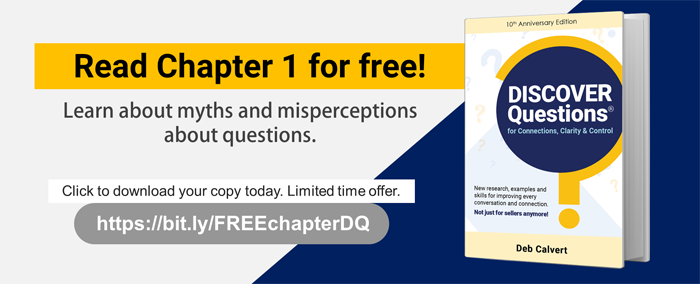Asking Questions to Influence Others
CEO Jim Schleckser says that if you want to influence others, you’ve got to ask quality questions. “When to comes to building influence, some people default to pummeling others with their superior logic and rational thought… Turns out, that is not an effective way to build influence.” Instead, he says, “Rely on carefully chosen questions to help someone see the world differently and from a different perspective.”
There’s a fine line, though, in the way you use questions to persuade. It’s not about backing someone into a corner or manipulating them. That will backfire. If your intention is to steer someone to a predetermined answer, don’t bother asking questions. Your artifice will raise suspicion and dissuade others.
Ask questions when you’re open to new information and others have freedom to choose authentic responses. If you ask questions before making up your own mind, the process of including others will make you more influential. Questions like these bring people into the process and help them get onboard faster.
-
What do you think?
-
What would you like to achieve?
-
What’s most important to you?
-
What concerns do you have? How can we address those and still proceed?
-
How do you feel about this?
Admittedly, asking questions like these may slow down progress. It’s faster to make unilateral decisions and tell people what to do. Until they resist. And they will resist! Then you’ll have to backtrack and leverage weaker tactics for influence – cajoling, bargaining, coercing, pleading, and compromising.
Getting commitment and buy-in at the beginning is far better. Asking questions draws others in instead of shutting them out. The kinds of questions you ask will determine how influential you are in enlisting others’ support. Two Harvard Business Review contributors offered three categories for questions used in influencing:
Convergent Questions probe for factual information. They have only one correct answer and do not invite speculation, projections, or opinions. If you’re asking who, where, or when questions, you’re seeking convergence. Use these to create a common foundation.
Divergent or Expansive Questions serve two purposes when influencing others. At the onset, they engage others in the process of scoping the situation and co-creating solutions. They also encourage bigger picture thinking and invite new ideas. Why, how, and what questions produce more expansive thought.
Integrating Questions come in handy when there are opposing positions. They build trust, urge compromise, and stimulate innovation. If…then question construction poses scenarios and give-and-take examples for others to consider.
Persuasion by reciprocation is considered one of the most powerful laws of nature. When someone picks up the tab for dinner, you feel obligated to reciprocate and will pay the next time you dine together. The same is true when you ask questions, listen, and genuinely consider others’ input. They will do the same for you.
Influencing and persuading others is not something to duck, dodge, or deny. It’s a healthy part of strong relationships. Questions make this a mutually beneficial interaction rather than a manipulation.
This is a snippet from the new book, DISCOVER Questions® for Connections, Clarity & Control, available on Amazon.

